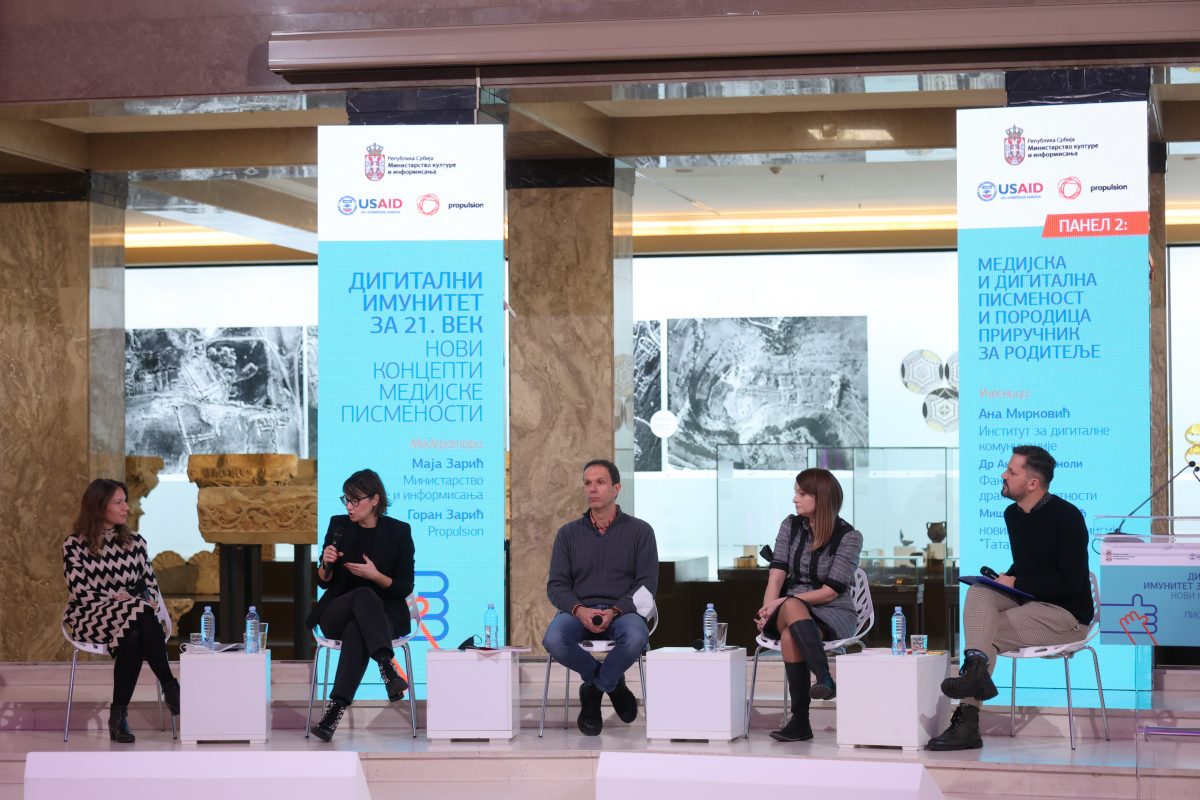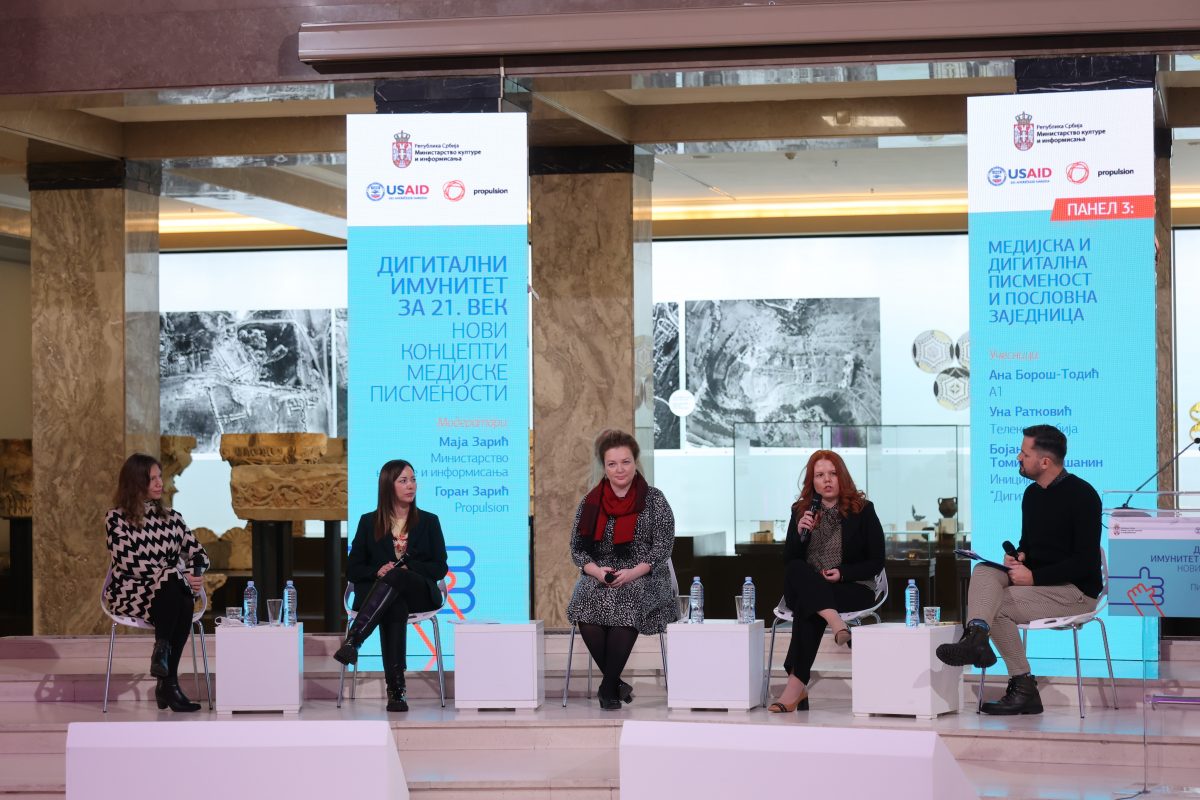Together, state institutions, international organizations, companies and interested individuals are working towards people acquiring the necessary digital skills.
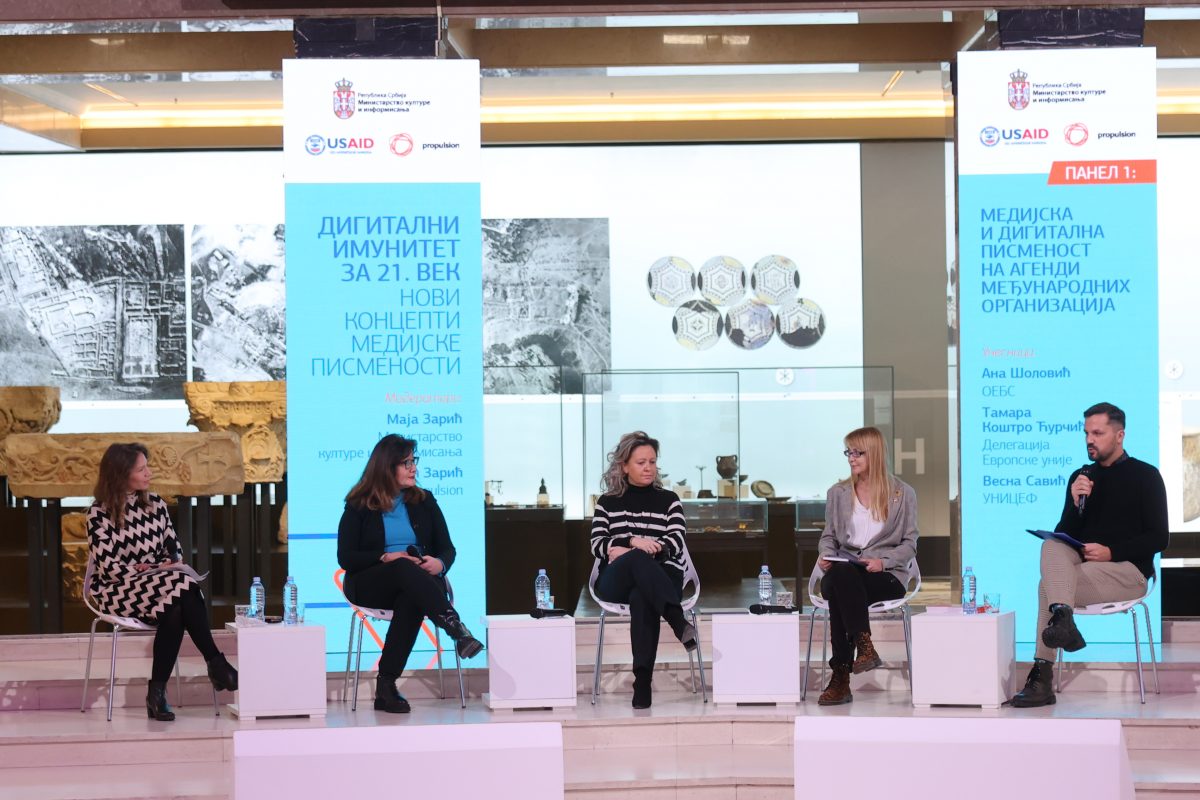
In cooperation with the New Literacy Programme, implemented by the United States Agency for International Development (USAID) and Propulsion, the Ministry of Culture and Information of the Republic of Serbia held an online conference at the National Museum titled ‘Digital Immunity for the 21st Century – New Media Literacy Concept’.
Slavica Trifunović, Assistant Minister of Information and Media at the Ministry of Culture and Information of the Republic of Serbia, officially opened the conference.
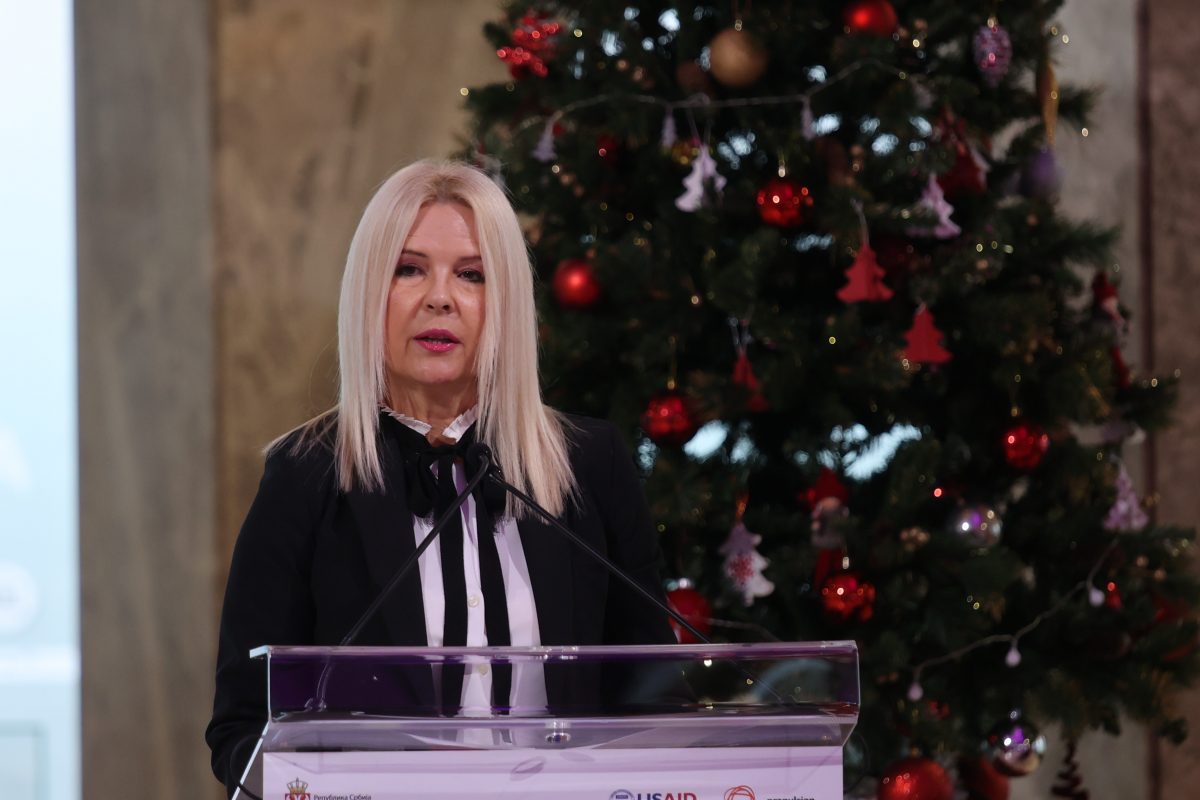
“The media are no longer just shaping our culture, but also affecting our digital immunity. And immunity needs to be boosted and maintained. That is why it is important to expand knowledge and skills relating to media literacy, because they provide us with the framework and methodology for new literacy that we need for life, work and active citizenship in the 21st century. In the process of obtaining media literacy, we have not forgotten about parents, so together with partners from the USAID New Literacy project, we have developed a Handbook for Media Literacy for Parents, which we will present today and which will soon be available in electronic form,” said Ms Trifunović.
Shanley Pinchotti, the Director of the Office of Democratic Governance and Economic Growth at USAID Serbia, said that she was happy that the USAID was given the opportunity to participate in the New Literacy Programme.
“Learning about media and digital literacy is also a way to learn how to turn technology to our advantage and not make it work against us. In cooperation with the Ministry, we hope that our support for media and digital literacy results in individuals, companies and civil servants obtaining new skills fit for the 21st century,” Ms Pinchotti added.
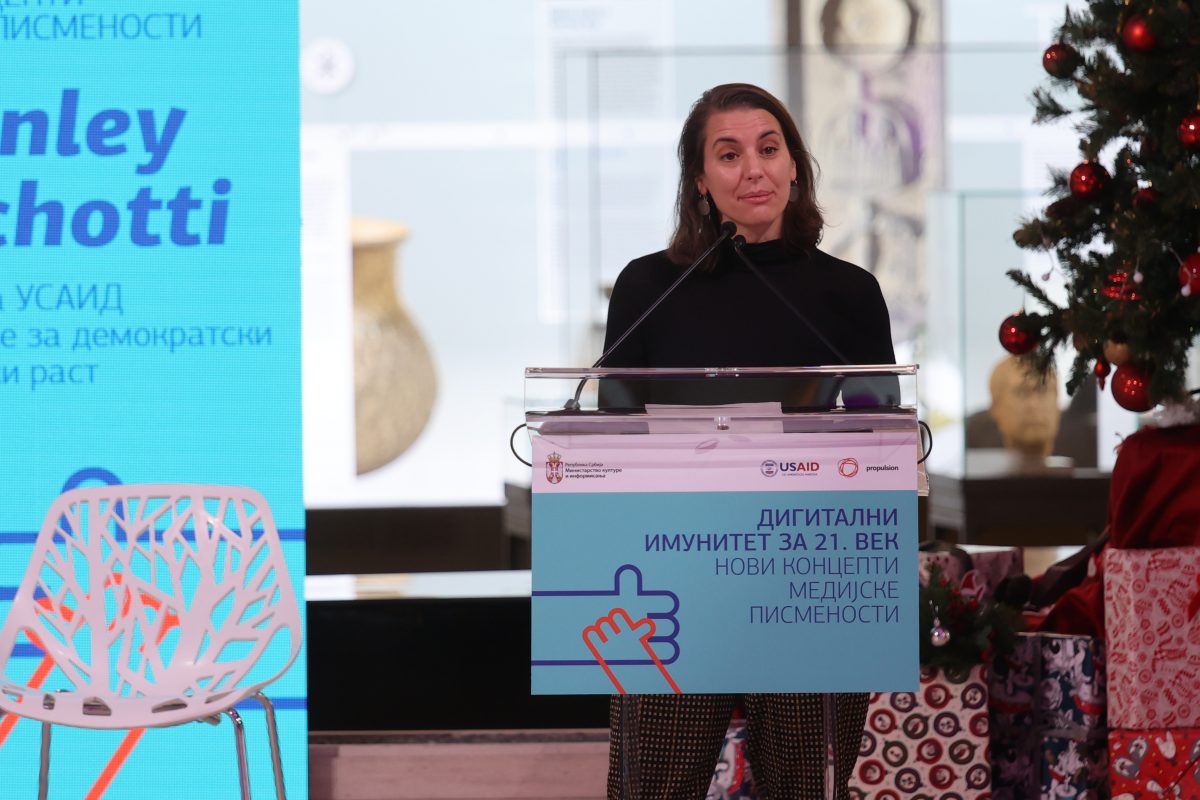
The panel discussions that followed were moderated by Maja Zarić, Head of the Group for International Cooperation, European Integration and Media Projects, editor and co-author of the Handbook Media and Information Literacy for Parents and Goran Zarić from USAID New Literacy Program Manager, Propulsion.
In the first panel, titled ‘Media and Digital Literacy on the Agenda of International Organizations’, we had the opportunity to hear about the activities of the OSCE, the Delegation of the European Union and UNICEF in this area of interest.
Ana Šolović pointed out that “in addition to knowledge and skills important for digital literacy, the OSCE has also included the values and principles of a culture of dialogue, respect for different opinions, freedom of speech, gender equality and everything that makes civic culture in its projects.”
Tamara Koštro Ćurčić stated that “together with the OSCE and other partners, the Delegation of the European Union has been involved in the issue of media strategy of which one segment is dedicated to media literacy. On the other hand, together with UNICEF, the OSCE is implementing a project to bridge the digital divide. The organization is also continuing to implement ongoing projects and will launch new ones that will be the next step in the development of media and information literacy. ”
Vesna Savić Djukić said that “next year, UNICEF will continue with the project of bridging the digital divide and building the capacity of educators in preschool institutions. Under the auspices of its regular programmes, it will continue with activities related to the early development and parenting programme where UNICEF works on increasing the competence of parents and children. We are also working on young people with skills fit for the 21st century, with digital literacy being the first on the agenda.”
In the second panel, called ‘Media and Digital Literacy and the Family – A Handbook for Parents’, we had the opportunity to hear from the handbook’s authors and how they prepare for writing it. Plus, the authors talked about how can parents navigate the digital world together with their children.
Ana Mirković, from Institute for Digital Communications, pointed out that “the manual is adapted for children of different ages and mental abilities”, and added: “We also have a section on how parents can approach children up to 6 years of age who are in a special stage of development, then the segment for children from 7 to 11 years of age and children who are 12 and older, while being mindful of their emotional and cognitive capacities.”
Ana Martinoli, PhD, from the Faculty of Dramatic Arts, pointed out that “the term media is much more important for children today than it has ever been for parents and that that is why they approach media with a lot of trepidation and fear or expect problems to be sorted out on their own. With this manual, we want to make it easier for parents and give them tools, know-how and skills on how to have a dialogue and communicate openly with their children “.
Miša Stojiljković, journalist and creator of the TV show “Tata ti si lud” (Dad, You’re Crazy), pointed out that, at the end, of the day he learned the most about new technologies, digital media and social networks from his children because they are the ones who follow all trends and are always active and present in digital reality. Parents are no longer omniscient and omnipotent but their role is to help their children have a quality life and to teach them how to use the options available to them.”
Representatives of the companies that currently implementing the highest number of projects related to digital and information technologies participated in the third panel called Media and Digital Literacy and the Business Community.
Ana Boroš Todić said that “A1 recognized the importance of digital and information literacy and that is why the company has launched the World You Want project to contribute to a better life for all of us. The company will continue implementing the project next year and deal with these topics in our future projects and activities.”
Una Ratković stated that “Telekom Srbija is implementing its projects in two segments, through improving digital technology infrastructure and educating end-users about these technologies, with Telekom Srbija expected to take on a significant role in this process.”
Bojana Tomić Brkušanin, from the Digital Serbia Initiative, pointed out that she is proud that “as a partner in the New Literacy project, the Initiative had the opportunity to take more than 500 students from specialized IT departments to Digital Serbia member companies where we showed them how these companies work and where they could see the know-how they can later use in practice.”
You can watch the entire conference on the Ministry of Culture and Information’s YouTube channel .
